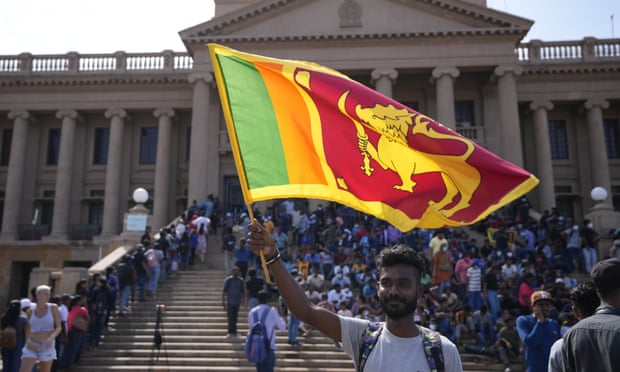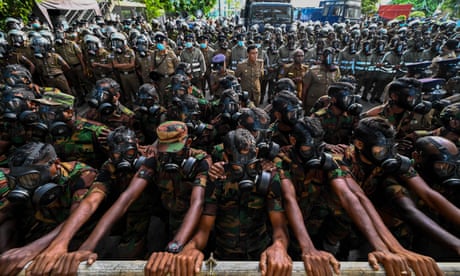Sri Lanka declares state of emergency as president flees country without resigning
Posted on July 13th, 2022
Courtesy Guardian
Protests break out across Colombo demanding Maldives-bound Gotabaya Rajapaksa step down immediately

Hannah Ellis-Petersen in ColomboWed 13 Jul 2022 07.43 BST
The Sri Lankan president, Gotabaya Rajapaksa, has fled to the Maldives on a military jet hours before he was due to resign on Wednesday, following days of extraordinary scenes including his presidential palace and office being taken over by anti-government protesters.
Following his departure, the prime minister’s office said a state of emergency had been declared as protesters continued to try to storm government offices.
The airforce confirmed that Rajapaksa, his wife and two security guards boarded a military aircraft in the early hours of Wednesday morning, after he invoked executive powers to enable his escape.
Under the provisions of the constitution and on a request by the government, the Sri Lanka air force provided a plane early today to fly the president, his wife and two security officials to the Maldives,” a statement said.
On their arrival in the Maldives capital of Malé at 3am, they were greeted at the airport by the president, Ibrahim Mohamed Solih, and his wife. At the time of his departure on Wednesday morning, the president still had not submitted a letter of resignation.
Protesters, activists and lawyers have called for the president to be prosecuted, along with various Rajapaksa family members, over alleged corruption and human rights abuses.
However, while he is still president, Rajapaksa enjoys immunity from arrest. It is believed that Rajapaksa will not officially resign until he reaches his final destination of the United Arab Emirates, which has long been a haven for disgraced leaders.

As news of his departure to the Maldives broke on Wednesday morning, protests broke out across the city of Colombo as people demanded he step down immediately. There was a heavy security presence outside the office of the prime minister, Ranil Wickremesinghe, and teargas and water cannon were deployed by police as the crowds gathered to demand the prime minister also step down.
Rajapaksa’s escape to the Maldives followed a dramatic 24 hours in which he unsuccessfully tried various means of leaving the country. He was blocked from boarding a commercial flight to Dubai on Monday night after airport staff refused to stamp his passport in the VIP area of the airport. India also refused to give permission for a military airport transporting him to land on its soil.
The president’s younger brother Basil Rajapaksa, who served as finance minister, was also prevented from boarding a flight to Dubai en route to the US where he is a dual citizen. Basil was also reported to have left the country on Tuesday night.
Gotabaya Rajapaksa, who was elected in 2019, has been resisting calls for his resignation for months, as Sri Lanka has sunk deeper and deeper into a financial crisis for which he is widely blamed. Rajapaksa and five family members who held senior government posts stand accused of widespread corruption and economic mismanagement which left the country without any foreign currency to import food, fuel and medicines, and pushed inflation to record levels. According to the UN, the island of 22 million people is facing a humanitarian crisis.
Rajapaksa was forced at the weekend to announce his intention to step down from power this week, after hundreds of thousands of protesters filled the city of Colombo and stormed into the presidential palace and offices, as well as the official residence of the prime minister. They have occupied the buildings ever since, refusing to leave until both Rajapaksa and Wickremesinghe step down.
According to the constitution, if Rajapaksa steps down on Wednesday, then Wickremesinghe will automatically be put in his place. This would be highly unpopular among anti-government protesters, who believe that Wickremesinghe – who took over as a caretaker prime minister two months ago – was responsible for propping up the Rajapaksa regime. Wickremesinghe has agreed to step down when an all-party unity government is in place.
Opposition parties said the unity government had been agreed in principle, though it was not clear who the new prime minister would be. If Rajapaksa’s resignation goes head as planned, parliament will reconvene on 15 July and MPs will vote on 20 July to decide the new president.